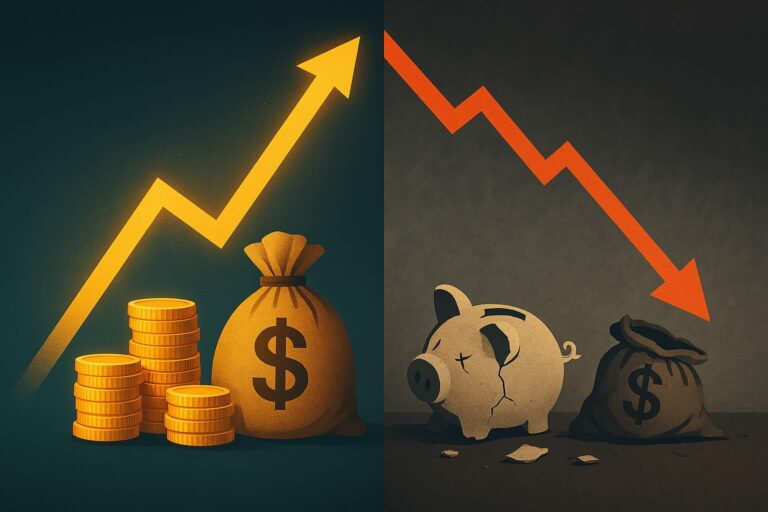From the Yahoo! Finance 2024 Invest Conference with Love
Every year, I make at least three investing pilgrimages:
- Berkshire Hathaway’s annual meeting in Omaha
- Markel’s annual meeting in Richmond
- Yahoo! Finance’s Invest conference in New York City
The Yahoo! Conference punches above its weight. It combines heavyweight speakers and a small, invite-only crowd – and in a peppy format befitting of the top investment media platform in the US.
Yahoo! Finance is eating food off of CNBC’s and Bloomberg’s plates
A media wonk point to give you a sense of scale: Yahoo! Finance now only has more than 150 million monthly visitors. I can’t find current viewership for its “over the top” (i.e., over the internet) TV viewership, but it was 6.2 million per month a few years ago, when monthly visitors were 93 million. If we pretend YF’s OTT viewership grew in proportion to its 93-to-150 growth in website visitors, it would have 10 million Yahoo! Finance “TV” viewers per month now.
For a sloppy comparison, erstwhile cable juggernaut CNBC appears to get around 100,000 viewers per week on pure TV. Fox Business Network recently surpassed CNBC and has no compunction about lording this fact over its rival:
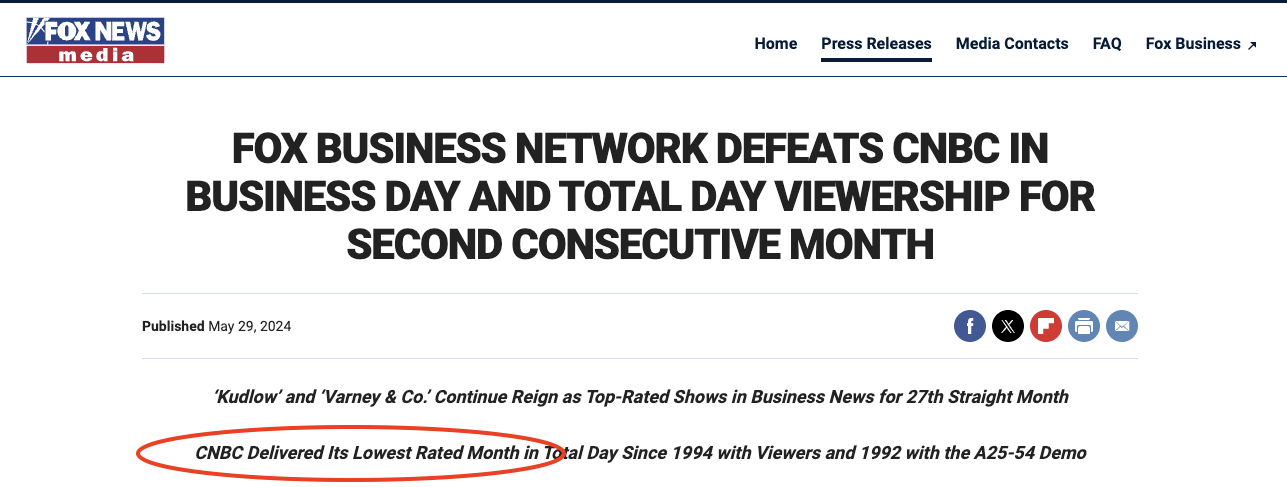
It’s messier than this, because networks run video on their websites, too (for $15/month, you can watch CNBC that way). Bloomberg noted 30 million cumulative visitors across its media platforms in 2022 – for the year – and another 49 million on social media, although it hasn’t updated that number – and I don’t wonder why.
Point is: Yahoo! Finance started as a purveyor of commodity financial data and has risen with the internet to become one of the big boys of investment content.
Back to the Yahoo! conference.
Yahoo! Finance Invest 2024: Key Takeaways
Across the speakers who spoke about economics, the most recurrent point was concern about the US national debt and interest expense. But aside from that, each speaker hammered his or her own nails.

I won’t cover every speaker, but here are some recaps that I found most relevant to investors.
1. Rick Rieder, CIO of Global Fixed Income at BlackRock
“Technicals are crazy good for equities” isn’t something I expected to hear out of Rick’s mouth, but he said it. “I’ve learned over the course of my career that technicals win.” Rick sees a market with “no sellers” (speaking hyperbolically). When asked about geopolitical risks, he mentioned that he’s lost tons of money hedging for them – though he is very worried about the US national debt, which is now almost $36 trillion, giving the US the highest debt-to-GDP ratio since World War II.
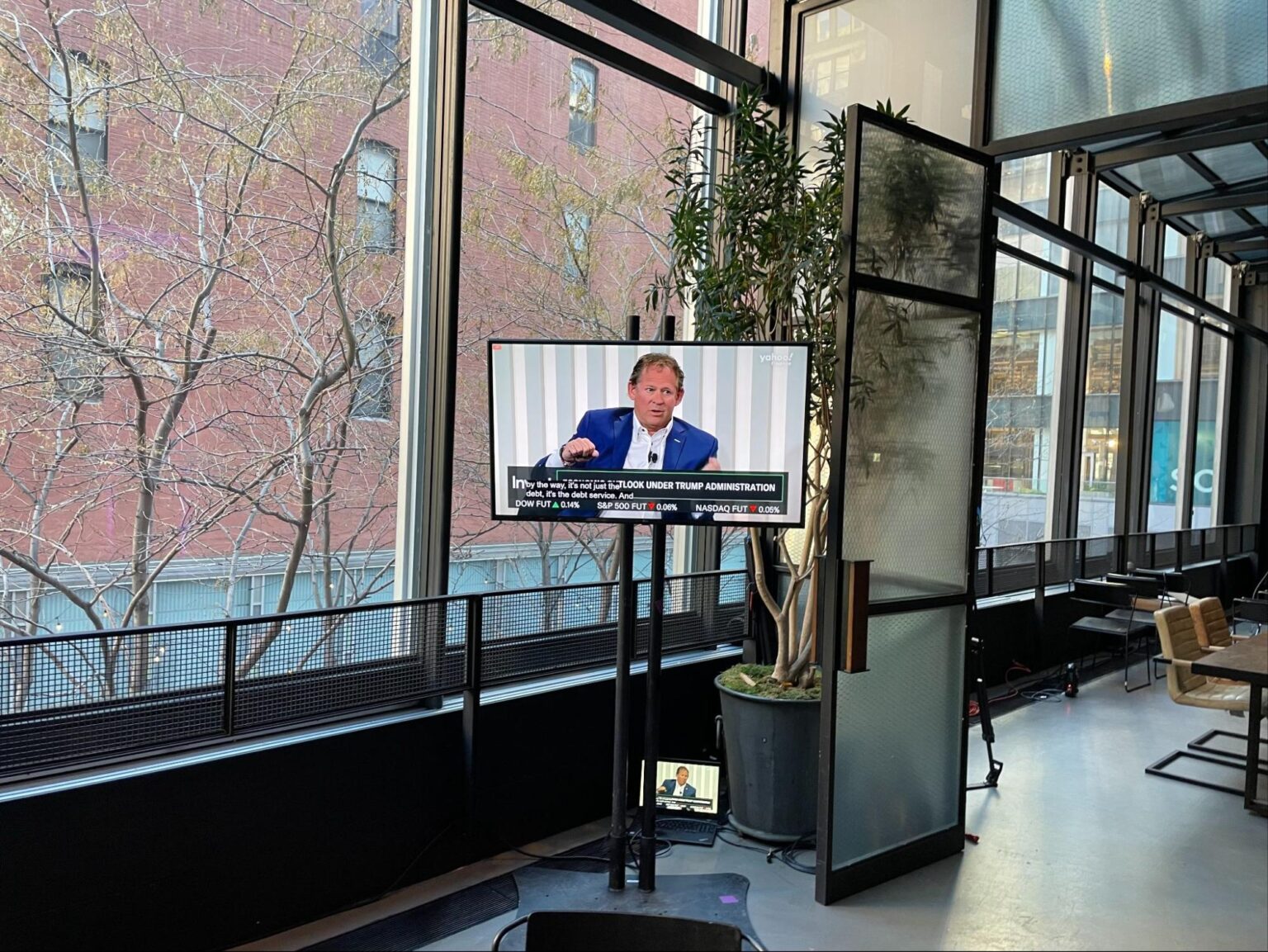
2. Tony Spring, CEO of Macy’s
When your format is dying, you go to a Yahoo! conference to talk about it. Actually, Macy’s isn’t dying, or at least isn’t dying quickly. But kudos to Tony for having the guts to take on what’s likely a bigger challenge than most people – perhaps even Tony – realize.
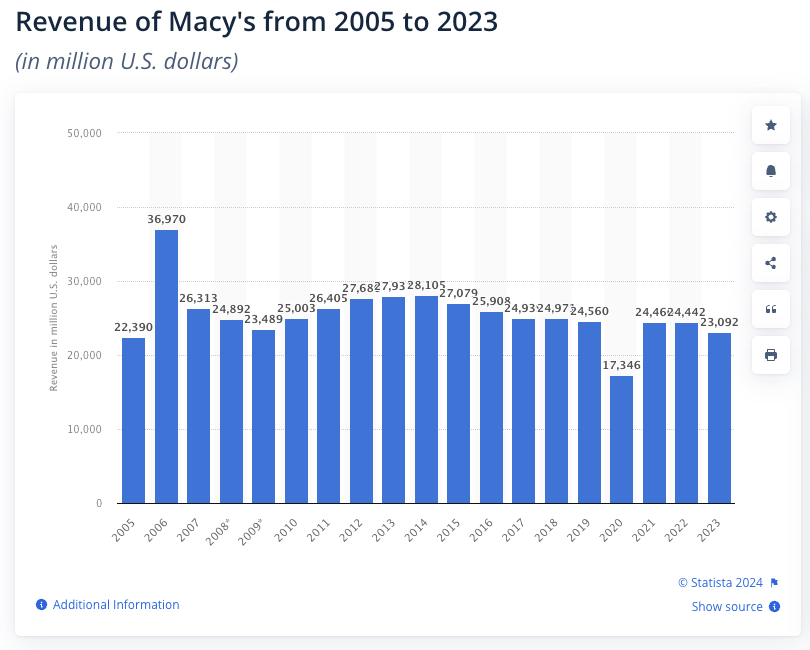
Macy’s owns Bluemercury cosmetics, whose annual revenue is now $750 million, but that’s a single-digit portion of the company’s overall sales. Tony reiterated earlier talking points about closing 150 underperforming stores and allocating all resources on the remaining 350 stores – pushing Bluemercury and Bloomingdale’s, especially, and adding more staff. Like many a CEO, Tony appeared to be talking his book. A slowly dying format with a good CEO is still likely to remain a slowly dying format.
But it’s not a binary thing. The job of a good CEO in such a case is not to ignore reality, throwing one Hail Mary pass after another in an attempt to regain lost ground – although this is what usually happens. It’s to guide the dying company to shrink and grow old gracefully, preserving as much shareholder value as possible.
But is this possible in real life? I don’t know.
3. Michael Mager, CEO of Precision Neuroscience
When your little startup raises $93 million to compete with Elon Musk’s Neuralink, a reasonable next move is to go to Yahoo! Finance’s conference to show off your little brain implant strip, which is thinner than a human hair and thus not easy to see in photos:
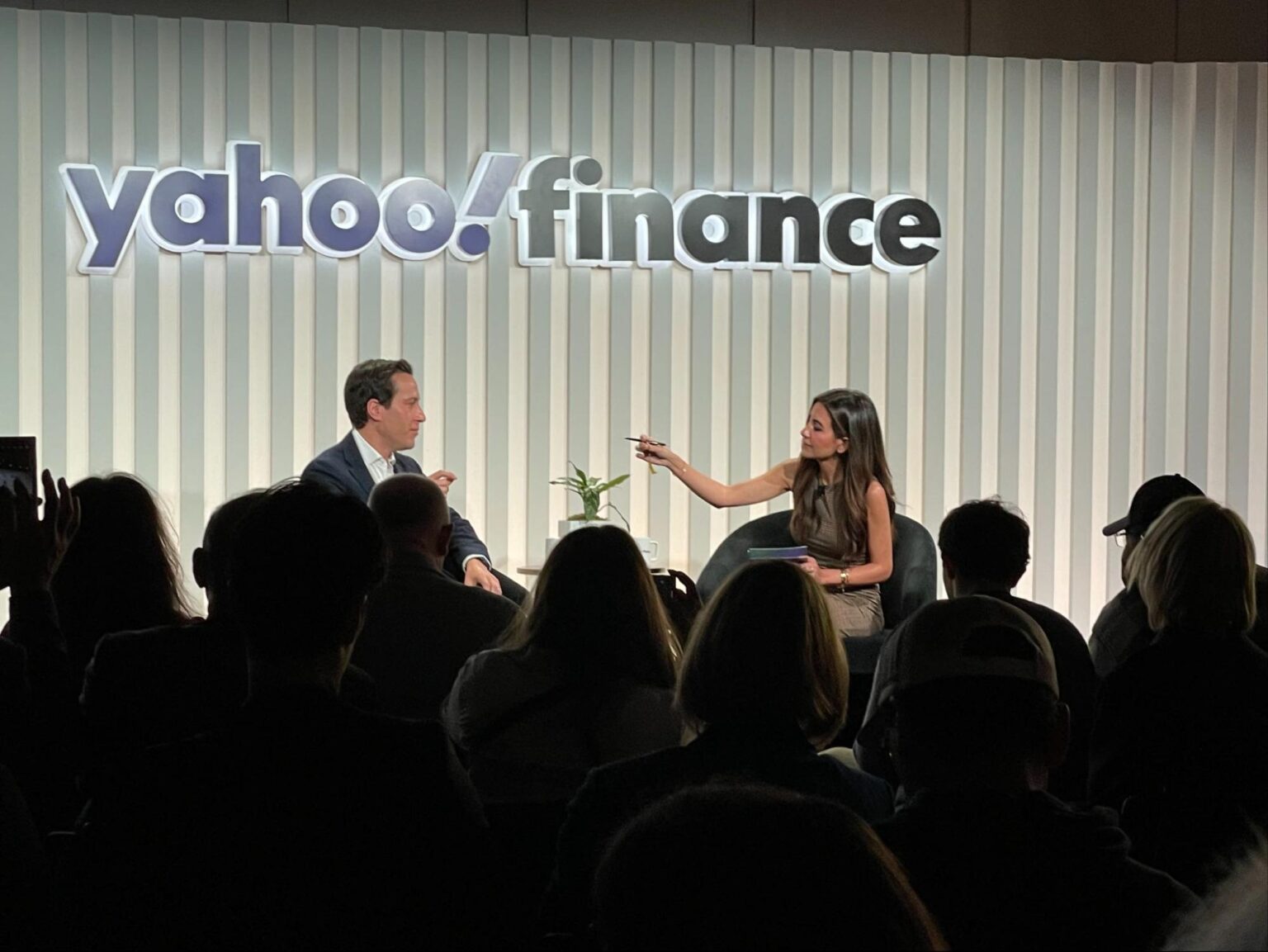
This is not a public company, but the cool factor had the audience interested. These implants promise to not only improve impairments from injuries and birth defects, but they could potentially make us, or at least the very brave among us, smarter. A good set of questions arose around privacy – nothing’s more invasive than plugging something into your brain, right? – to which Michael didn’t seem to have good answers, except to say that his offering would be HIPPA compliant.
Ok.
4. Brian Moynihan, CEO of Bank of America
Besides being a brain implant fan, Michael is also a Brian Moynihan fan: Or at least he was quite interested in Brian’s talk, from what I saw of him standing to watch out of the corner of my eye. He wasn’t alone: Brian was arguably the fan favorite of the day. Brian was considered a lukewarm candidate for B of A’s CEO role when he assumed it in January of 2010 – I was The Motley Fool’s financial industry expert at the time, so I remember speaking in the media about his “running sideways with the football” – but he’s evolved into a respected elder statesman of the banking space.
Importantly, and befitting of a banking CEO, Brian is levelheaded.
Brian, too, worries about America’s national debt. He is strongly in favor of an independent Federal Reserve, and has no desire to join the incoming Trump Administration in a polite-but-clear-between-the-lines messaging that he – like most in the finance industry – doesn’t see Trump’s desire to give the Executive Branch input or control over the Federal Reserve to be a good move.
5. Karen Karniol-Tambour, Co-CIO, Bridgewater Associates
Sleeper hit of the day with a strong signal-to-noise ratio. A friend I attended the conference with agreed. Karen thinks Trump is both good for growth and inflationary – but if we get enough productivity (such as through AI), the economy won’t be too inflationary. Europe is up a creek, by the way: European productivity is terrible, as anyone whose 5:01pm email to a European colleague has gone unreturned until the next day can attest.
She thinks the effects of the Trump tariffs – a common question topic – are hard to predict b/c of counter-tariffs, but that the US is less vulnerable to tariffs than other countries. Trump’s tariffs could cause 50bps (half a percentage point) of inflation, but it would be a one-time bump, so it might not be something Fed acts on.
Karen sees a 2.5% inflation target as more realistic than the Fed’s 2% target, and that the market is correctly pricing in fewer rate cuts than before Trump won.
Karen thinks market valuations can go a lot higher – the good part – but that compared to prior periods, people are very, very exposed to the stock market – the bad part.
“I see very few people who need to buy more.”
But if nobody needs to buy more, how do prices rise? From people who don’t need to buy more buying anyway?
6. Neel Kashkari, President and CEO of the Federal Reserve Bank of Minneapolis
Peter Attia’s economic doppelganger was described as “a very cool guy” to me by former Yahoo! Finance anchor Brian Cheung a few years ago (Brian’s at NBC now). I didn’t talk to Neel, but I don’t doubt Brian.
Neel came across as sanguine and candid. He doesn’t worry about tariffs causing big inflation unless some tit for tat starts. Unlike Karen, he’s confident about the Fed’s 2% target – perhaps it’s his job to be confident – and declared his vibe to be “cautious optimism”
He’s jazzed about the labor market’s resilience (“resilience” has almost been an understatement), and that consumer spending and the savings rate were surprisingly positive.
In deciding a rate cutting path, he looks at productivity along with the balance between savings and investment: The higher the productivity, the higher the neutral rate (the rate at which monetary policy is neither expansive nor contractive).
Neel also isn’t jazzed about the national debt, noting that it’s approaching 100% of GDP.
In news that surprised exactly nobody, Neel doesn’t like the idea of Trump interfering with the Fed
“The labor market is strong. We want to keep it strong. But we want to get back down to 2% inflation.”
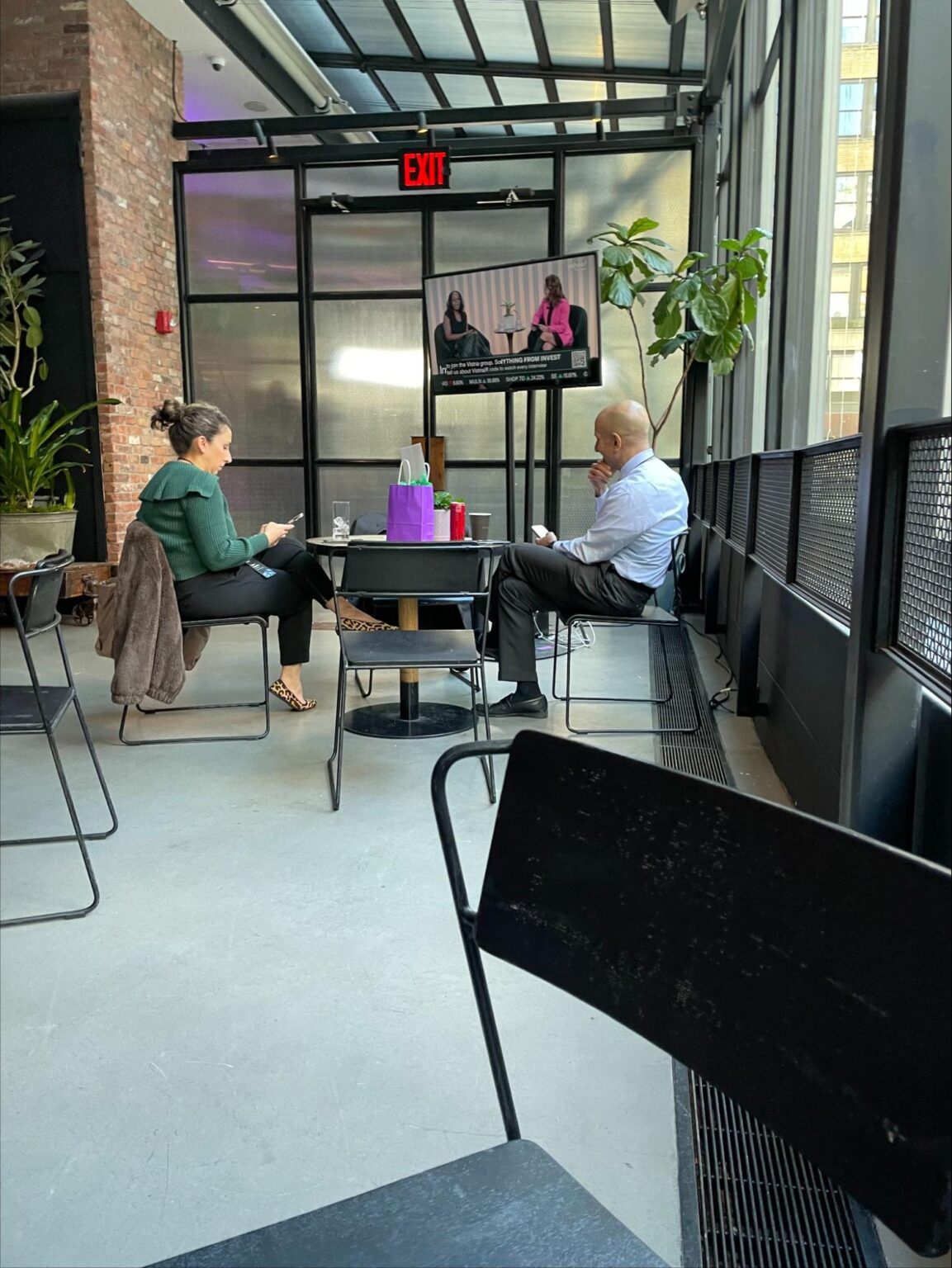
Surveillance photo of Neel chilling before going on.
7. Judy Shelton, Senior Fellow at the Independent Institute
If I had a chance to ask Neel one question, it would have been:
“How do you feel speaking at a conference with Judy Shelton?”
Judy Shelton was an economic advisor to President Trump in his first term, though his attempt to nominate her to the Federal Reserve was unsuccessful.
Kudos to Yahoo! for including a Fed guy and a Fed basher in the same conference.
Judy is not a Fed fan.
“Should the Fed set the price of capital – 12 people meeting 8 times per year? Or the free market?” she asked.
Judy – who likes gold, not surprisingly – feels the Fed doesn’t have much influence over employment and has transferred power from the private to the public sector, and wonders why the Fed gets to decide that everyone should lose 2% of purchasing power every year: “Inflation followed by high borrowing costs is a “double whammy” to people.”
Judy prefers a supply side approach to money – having greater supply than demand should reduce inflation, she notes – with lower taxes and less regulation. She thinks cutting demand by raising rates isn’t a good solution – and thinks that Jerome Powell could have been more gracious in responding to Trump’s threat to nix him. (Speaking as an analyst, this claim seems more like playing to a certain audience to me; I don’t think anyone from any party (including Trump himself) would call Trump’s words about Powell “gracious.”)
July feels the Fed channels financial rewards to certain members of society – the wealth surge has enriched people who already own financial assets – and because of this, the Fed’s process or function is inherently political. Judy, who says she’s been called “a quack” and “right-wing fringe” also dislikes that central banks can manipulate and depreciate currencies.
“If gold is such a worthless metal, why does the US government and all the governments hold so much?”
I may not agree with all, or many, of Judy’s points, but I’m actually grateful to Yahoo! Finance for inviting her, because she did get me thinking – more than any other speaker that day.
And I’m of the belief that we should actively seek out differing views because it’s how our own views grow.
So, thank you, Judy – and thank you, Yahoo! Finance.
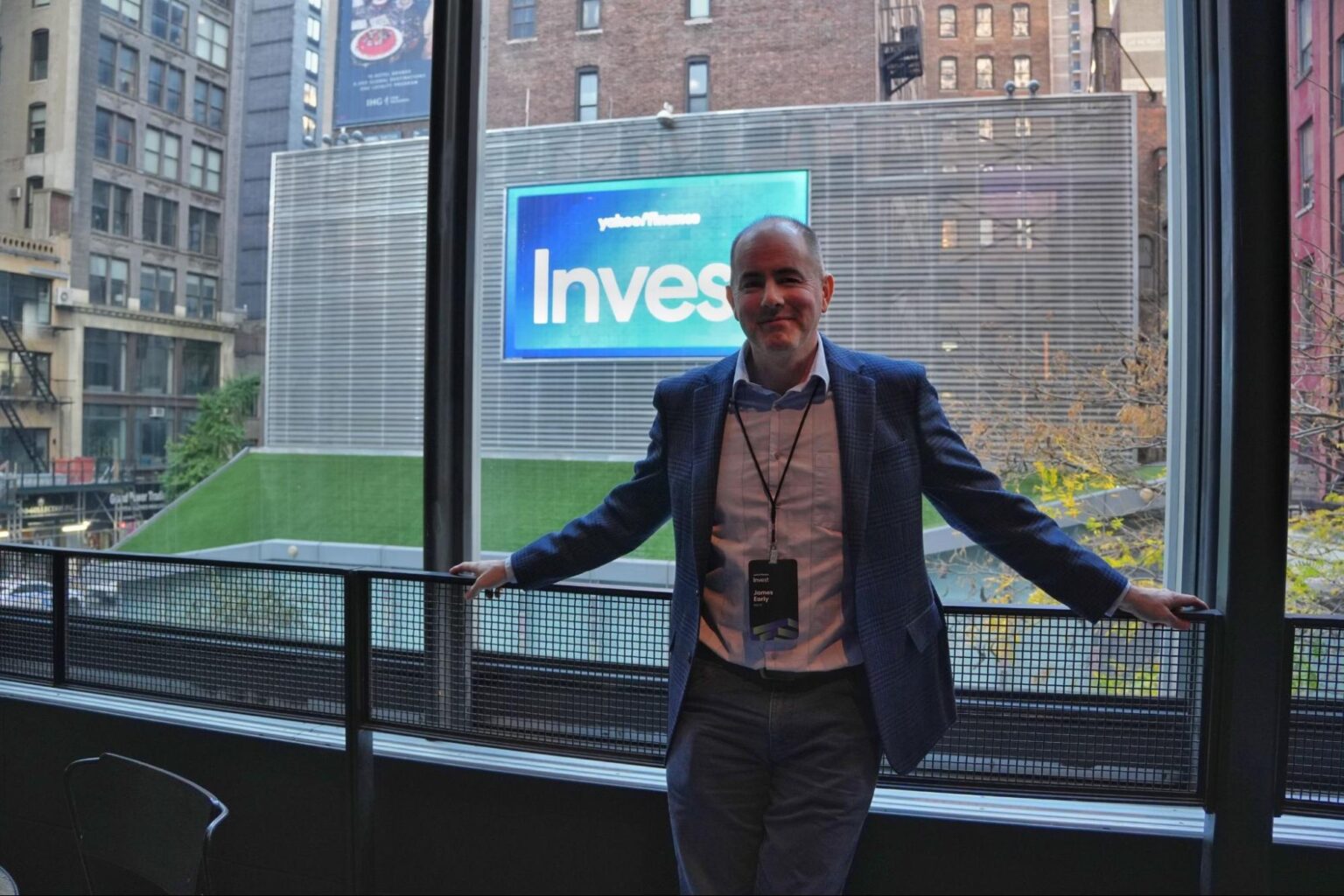
This article is for informational purposes only and is neither investment advice nor a solicitation to buy or sell securities. All investment involves inherent risks, including the total loss of principal, and past performance is not a guarantee of future results. Always conduct thorough research or consult with a financial expert before making any investment decisions. Neither the author nor BBAE has a position in any investment mentioned.





